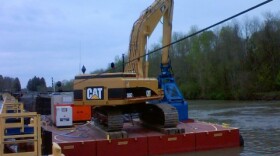The Dutchess County Executive and local leaders went to the Poughkeepsie waterfront Monday, calling on the Environmental Protection Agency to require more PCB cleanup of the Hudson River. This comes as the agency considers public comment on its five-year review.
Republican Dutchess County Executive Marc Molinaro urges the EPA to take further action.
“And we need them to demand complete and comprehensive cleanup for our communities and the very future of the Hudson River Valley,” Molinaro says.
The EPA released its second review of the cleanup of PCBs from the upper Hudson River June 1. EPA held three public meetings, including one in Poughkeepsie, and a public comment period on the review closed September 1. The review concludes that the $1.7 billion cleanup of the Superfund site is working and, while not yet protective, EPA expects that it will accomplish its long-term goal of protection of human health and the environment when the cleanup is complete. Molinaro and others disagree, and want EPA to walk back its claim that the cleanup ultimately will be protective. An EPA spokeswoman says the agency met numerous times before, during and after developing the proposed report with a specially-formed five-year review team and the Hudson River Community Advisory Group. She says EPA received about 2,000 comments from individuals and groups and is now in the process of reviewing those comments, with a final five-year review report expected by late fall. Ned Sullivan is president of Poughkeepsie-based environmental group Scenic Hudson.
"EPA needs to carry it on, finish the cleanup in the upper Hudson and complete a remedial investigation of the lower Hudson and drop its unsubstantiated claim that the cleanup will be a success in 50-some years,” Sullivan says.
General Electric removed 2.65 million cubic yards of contaminated sediment from a 40-mile stretch of the upper Hudson through 2015. Molinaro says the mid-Hudson River has been paying the price.
“So Dutchess County wants to make clear, and all of us here in service in the Hudson River Valley, that the future of our community demands a clean Hudson River, that the future of our economic vitality demands a clean Hudson River, and that we owe it to our children and their children to have a waterway that they can enjoy, that they can appreciate and maybe, perhaps, people like Joe Bonura will be able to even serve the fish on his menu,” Molinaro says.
Joe Bonura, Jr., is principal with Bonura Hospitality Group, which owns Shadows on the Hudson, the restaurant sitting above the Shadows Marina where Molinaro and others gathered.
“And what’s interesting that that, while we serve fish from all over the world, we can’t serve any fish from right here,” Bonura says. “And I know that that may be a long way off from happening, but wouldn’t it be a great goal to shorten that length of time.”
Bonura says his family has invested in redeveloping properties along the Hudson and sees a cleaner river as attracting more economic activity. EPA officials expect that it will be more than 55 years before all local species of fish are clean enough to eat once a week. Democratic state Assemblymember Didi Barrett says further remediation cannot wait.
“I think that we need to make it clear that this is not something that we’re willing to just sort of negotiate away or find some other way to address,” Barrett says. “This is something that we need to see happen now.”
GE spokesman Mark Behan responded to calls for additional dredging after the EPA’s Poughkeepsie meeting at the end of June.
“We’ve just completed an unprecedented cleanup of size and scope unmatched in the country.
And we think the right answer now is to assess what has gone on so far, see what the results of that are, and use that information, that data collection to inform the next set of decisions that need to be made,” says Behan.
He said extensive data collection continues in the upper, mid and lower Hudson to assess the benefits of dredging. Scenic Hudson’s Sullivan underscores that the public comments were on a draft report with no final conclusion by EPA.
“And so we’re going to keep the pressure on,” says Sullivan. “We think that the regional office must face the facts and acknowledge this, but we’re also talking to EPA headquarters to ensure that they understand the importance of this for the health of the region and its economy.”
Republican state Senator Sue Serino and Democratic Assemblyman Frank Skartados also spoke in support of EPA directing further PCB cleanup.











